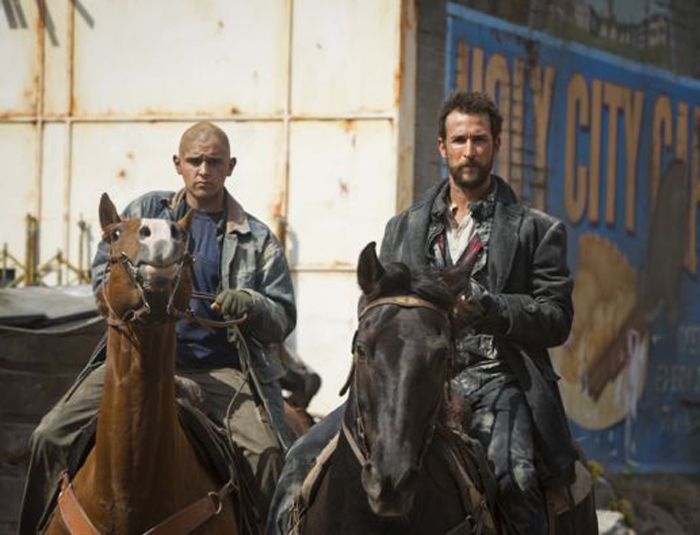When TNT's hit sci-fi drama Falling Skies returns June 9, seven months will have passed in Charleston, South Carolina, the new home of the series’ central characters. Plenty of changes have taken place, including Tom Mason's elevation to president of what showrunner Remi Aubuchon calls "the last of the United States." He, along with actors Noah Wyle, Moon Bloodgood and Doug Jones, met with Spinoff Online and other journalists last week to discuss where the characters are at the start of the third season and tease some upcoming storylines.
Besides the Mason presidency, one of the biggest changes in Season 3 is the inclusion of friendly aliens. Besides a pack of renegade Skitters, another race known as the Volm also lends aid to the Charleston group. Jones portrays a Volm nicknamed Cochise. From the start, Mason values his extraterrestrial ally, but as Aubuchon warns, "There's something going on that he's not telling us."
Jones, known for his performances under heavy creature effects make-up in such films as Hellboy and Pan's Labyrinth, continues that tradition with Cochise. "For the most part, I was in practical make-up and a costume," he explained. "Where the CG enhancements came in handy was my eyes." The character's eyes are set wide apart and above Jones' eyebrows, "So when those eyes are looking around or blinking, that's the CG enhancements."
Aubuchon called Jones' talent in the suit "magic." When Cochise appears in the background of shots, the producer opts to forgo any enhancement to the photography because the actor "makes it come alive."
Jones credits Aubuchon and his writing staff with making Cochise a "multi-layered character." He noted the helpful and intelligent qualities that "an alien should be," but teased that the character's heart and soul will be revealed over the course of the season. "I find him to be not only a strong warrior, but also quite charming," he said.
"In every character, there are all sorts of sides," Aubuchon interjected. In the case of Cochise, this includes "some sort of pain" that will be explored as the season progresses. According to the producer, "It's eating at him a little."
One development that worked out well for Bloodgood was the writers' decision to make her character Ann Glass pregnant at the end of Season 2. The timing couldn’t have been better. "When we were on set, Remi took my husband aside and goes, 'If you two want to get pregnant, it would be a good time right now,'" she recalled. Within a few weeks, the actress was indeed pregnant.
As the character was already headed in that direction, Bloodgood found the producers very accommodating. "I didn't have to hide my pregnancy, it was part of my life and I could do the pregnancy walk," she said. "I was a little nervous, but [everyone] rallied around me. It ended up working out with how pregnant I was." In addition to using her physical condition as a plot point, the producers also gave her time off to have her real baby. On the show, Ann will "voluntarily leave, but involuntarily get taken," she said, laughing. It was the best way she could tease how her absence would be explained in the story.
Cochise and Ann represent the narrative extremes on the series, with the personal set against the backdrop of large-scale dramatic stakes. It’s a balance Aubuchon strives for. While the show is about "a group trying to maintain self-identity," it also features the key theme of Tom Mason's need to keep his family together. "He will discover how hard it is to do," Aubuchon teased. With the character's past as a history professor, the show inevitably finds itself utilizing American history in both subtle and obvious ways. "We're not trying to make a polemic," the producer explained, but it continues to be an intriguing source of stories and conflicts.
As for playing Tom, Wyle notes the scripts often start with the civics right on the page. "We're heavy-handed with it, almost intentionally. When we get to the set, we take out [lines] so it's not so heavy-handed," he said. Dialogue is further trimmed back in editing, creating that balance between the pointed political discussion and the character drama.
"I think that's the road we try to walk," he added. "It stems from both fathers on this job. Steven Spielberg is the master of science-fiction drama. Michael Wright [president and head of programming] at TNT knows how to program in a populist way for nation." Where Spielberg shepherds the technology and alien aspects of the show, Wright keeps the "human, hope and humor" elements at the forefront. Looking back on the first season, Wyle called it "the deconstruction of an intellectual" in which Mason learns his academic skill-set is useless in the face of an alien invasion. The subsequent season showed Mason bridging the gap between his "ever-growing militancy" and the professor he was once. This season, Wyle sees Mason continuing to evolve into a "warrior-statesman."
Asked if the storylines adhere to some master plan, Aubuchon quipped, "Everything has been planned out to the Nth degree." In reality, he and his writers keep the storylines somewhat loose to allow for actor availability, the practicalities of production and the surprise ideas that appear in the writer's room. "We always want to make room for the cool and happy accident," he said.
Bloodgood reflected on one happy accident in Season 3: Ann is never acknowledged as the First Lady. "They never even reference that. I think because there was so much going on when the season started, we literally didn't have time." She was glad, and doubts Ann could easily adapt to the First Lady role. "She's too off the radar, but that would've been something to play with a little bit more."
Instead, she was more concerned about doing any medical scenes when E.R. veteran Wyle was on the set. "I know he's better than me,” she said. “He knows how to do it 20 times better.”
Falling Skies returns to TNT on June 9 with a two-hour premiere.


